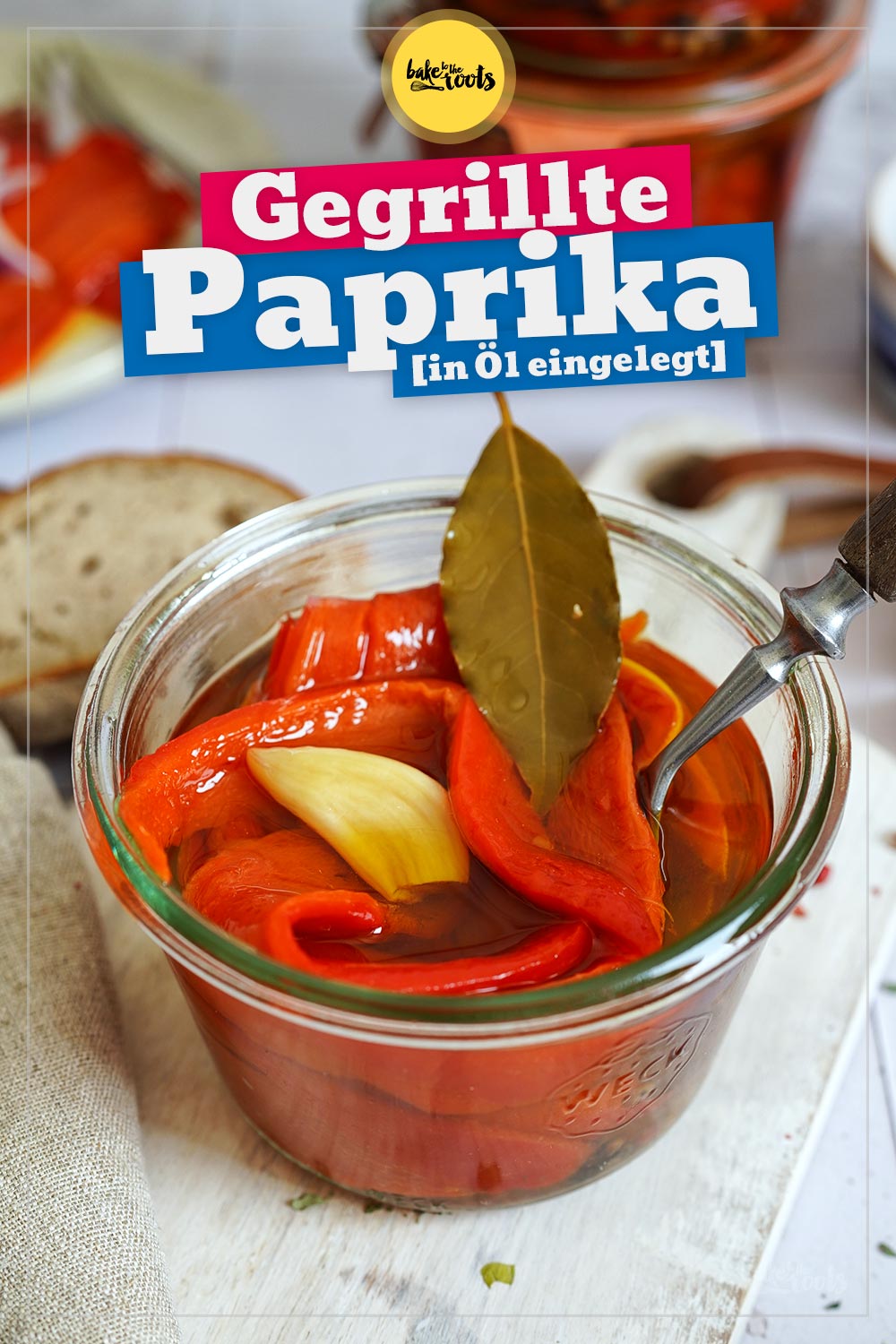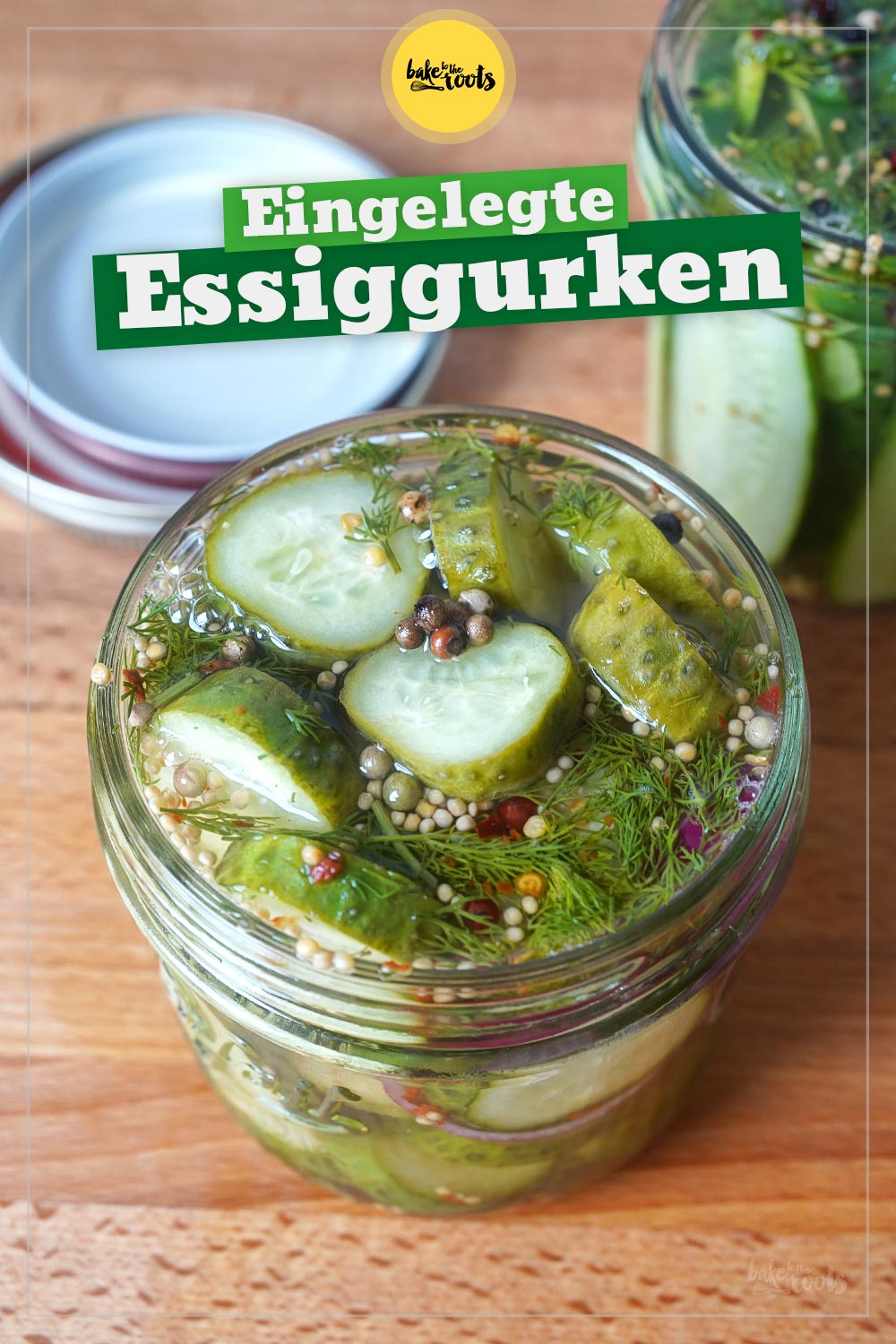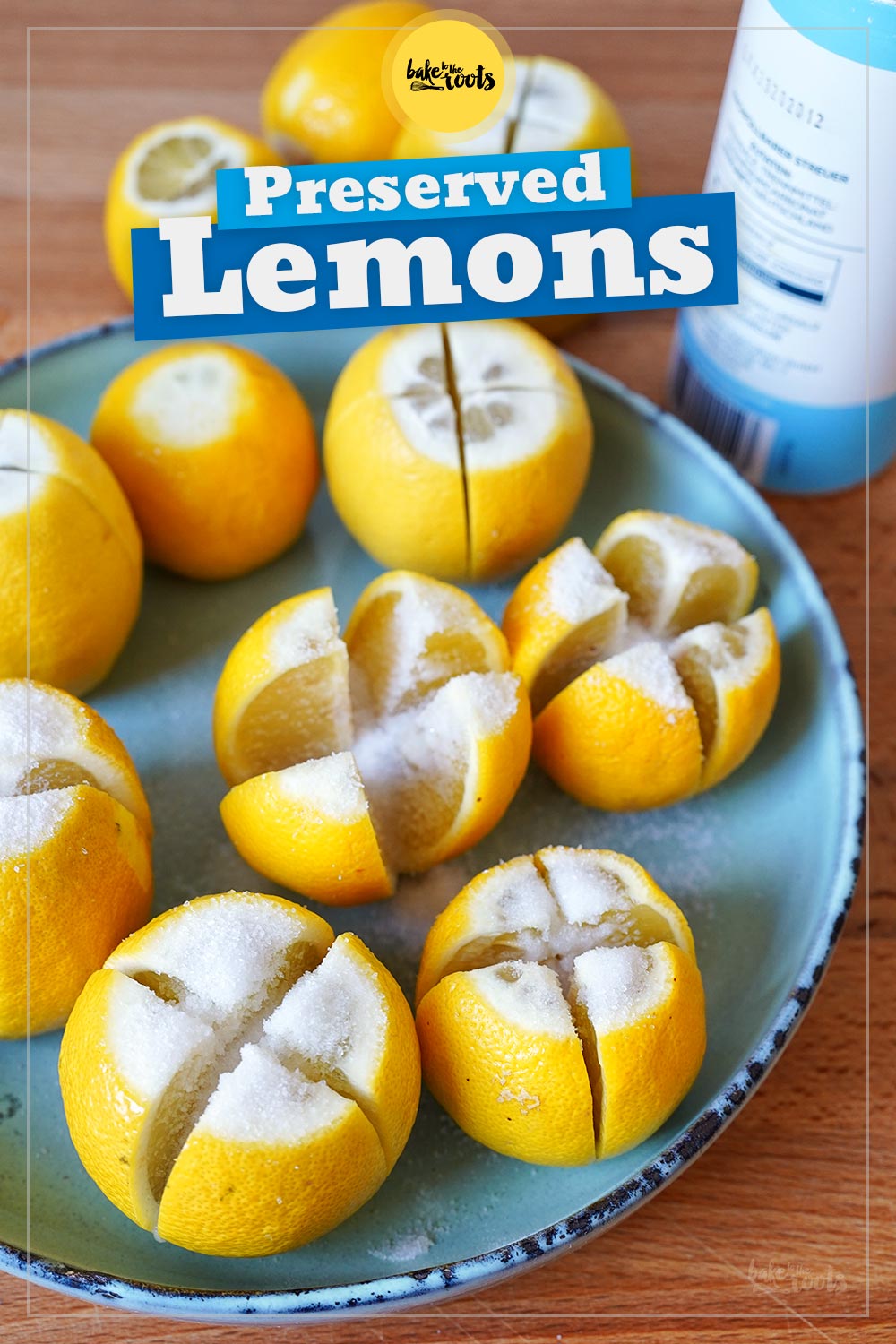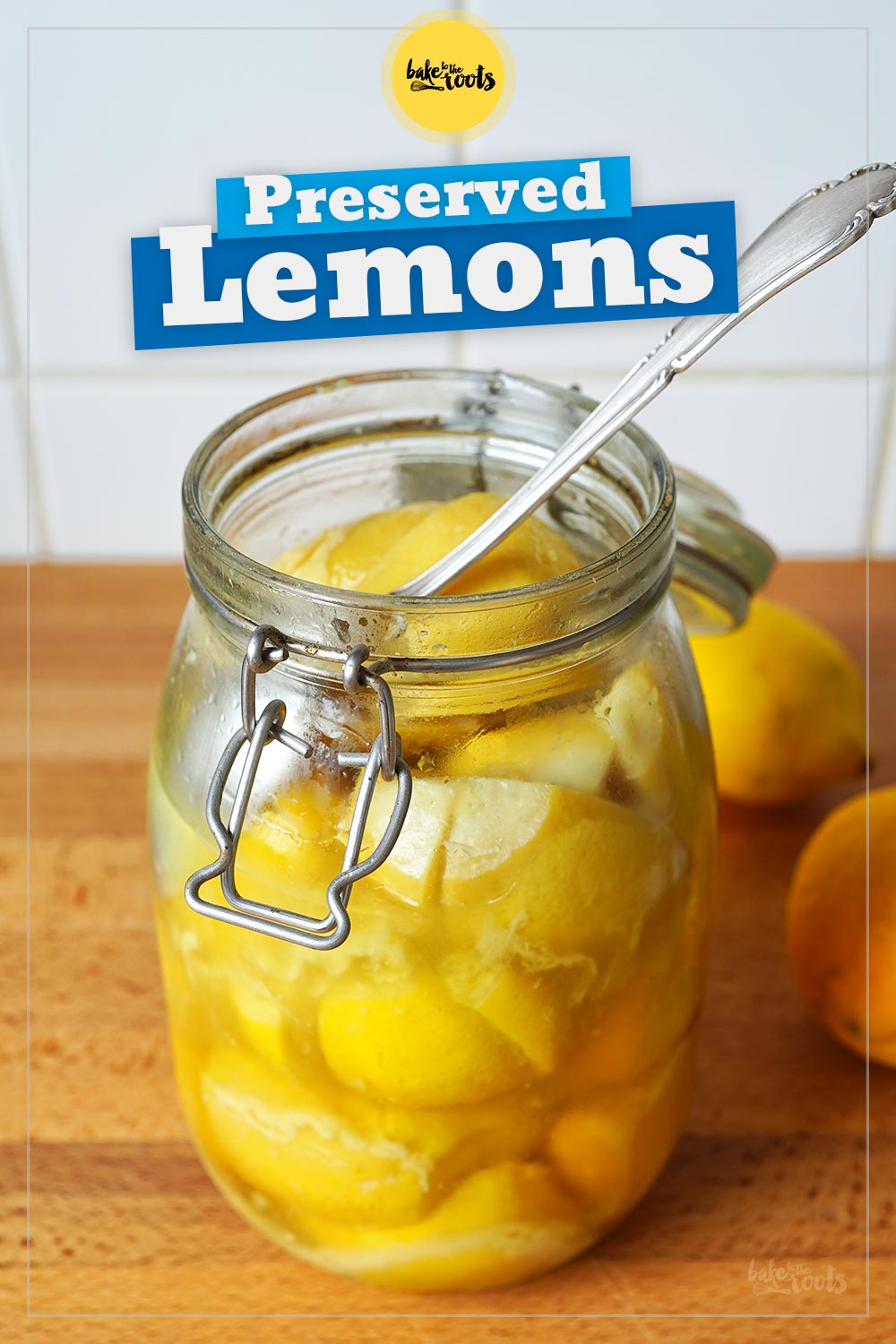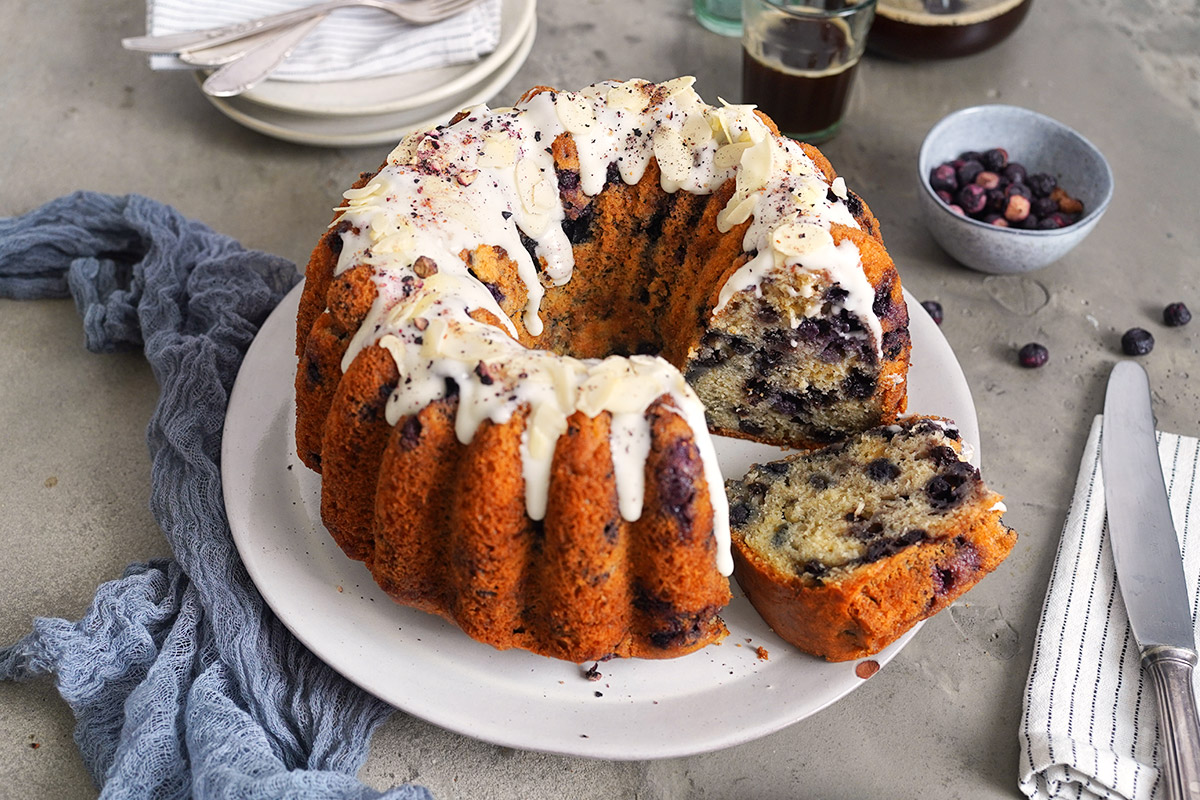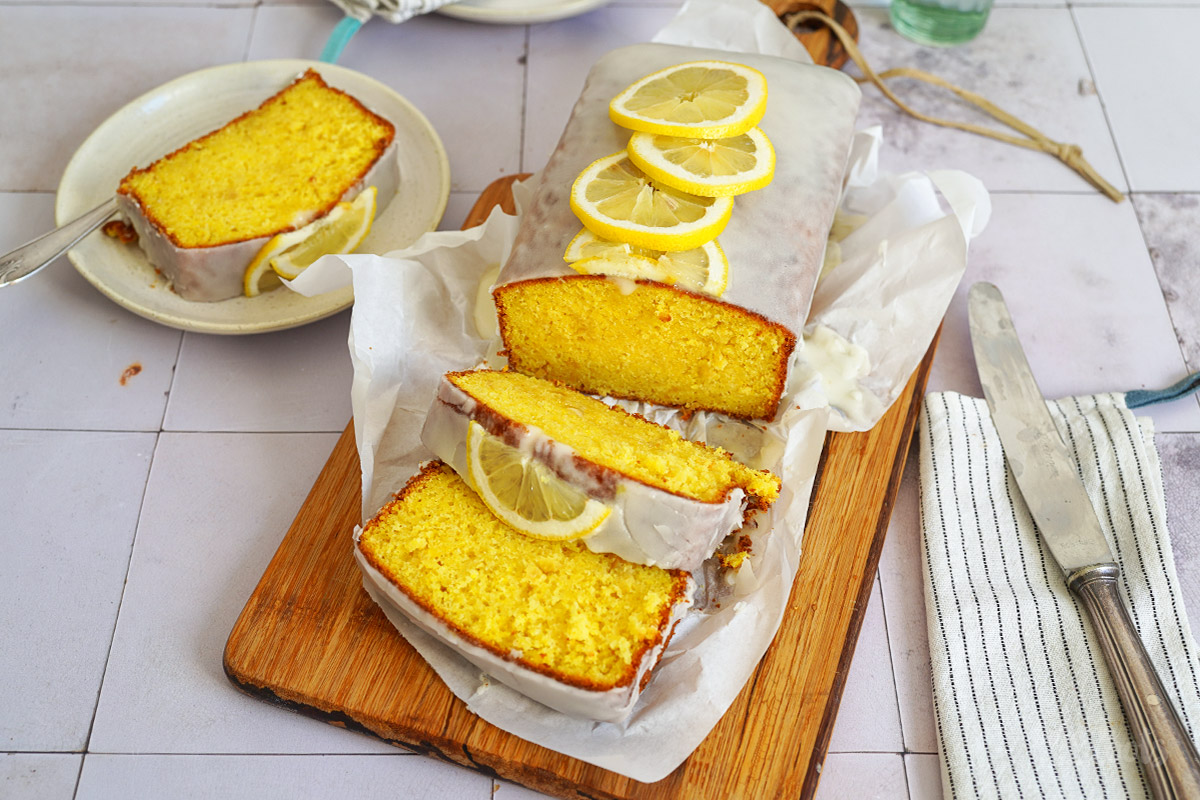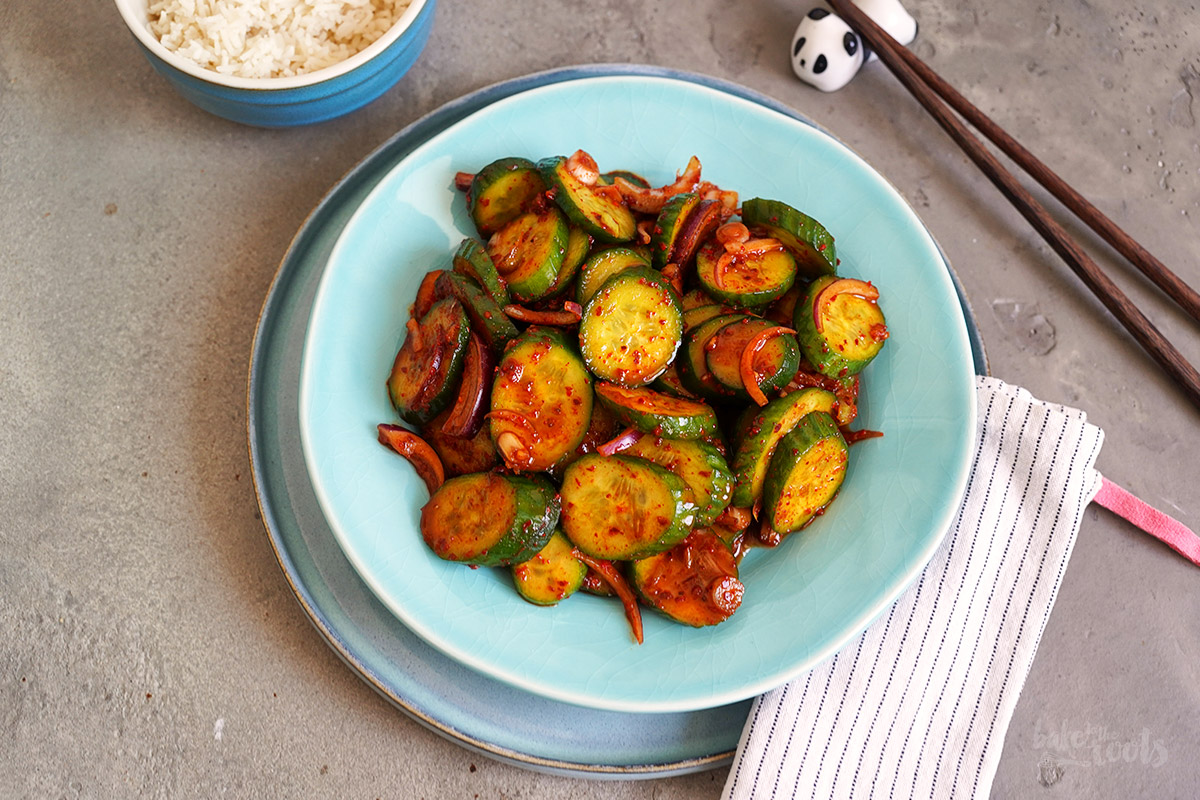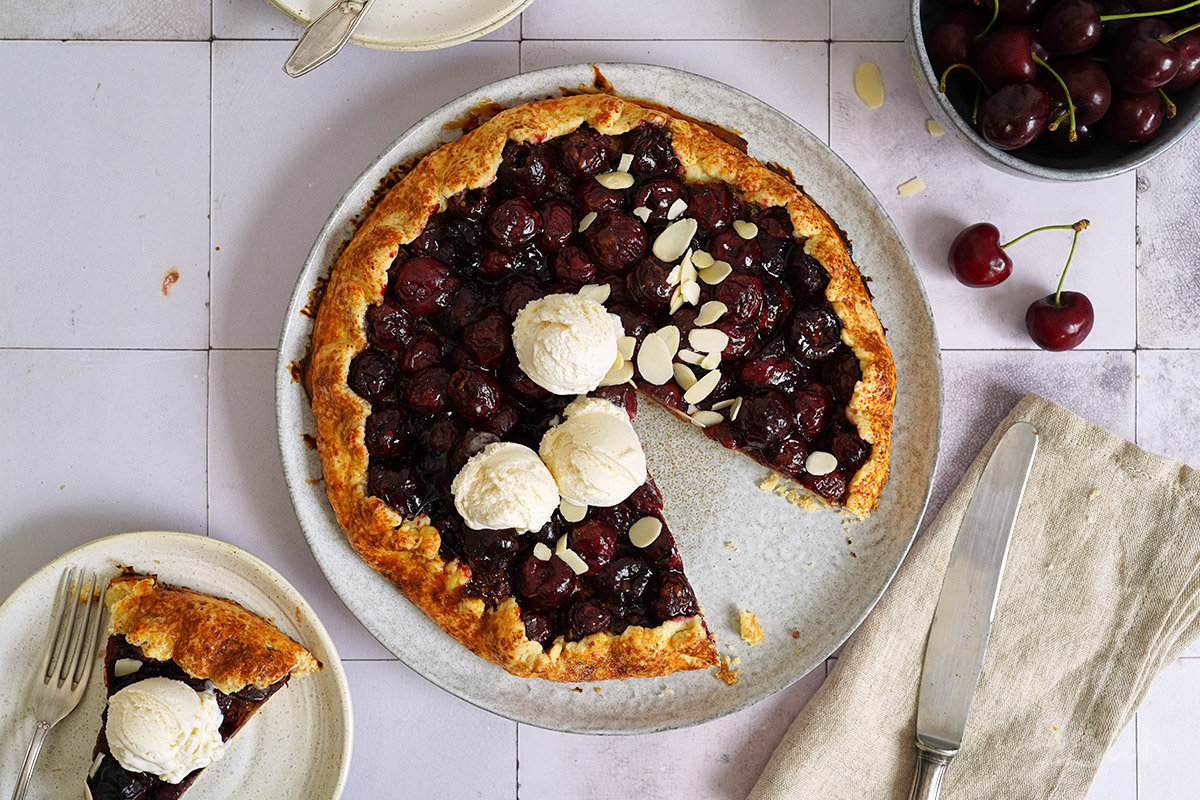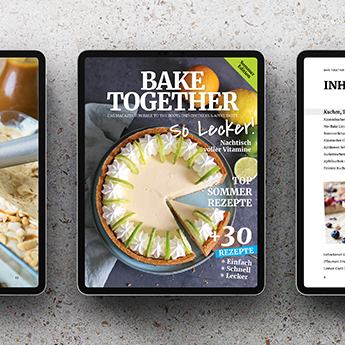Using preserved lemons is not particularly common in German cuisine. Whenever a chef wants to experiment a little, they might use Preserved Lemons aka. Salt Lemons, but they are not commonly used in our part of the world. In Morocco and some other national cuisines, however, the situation is quite different… ;)
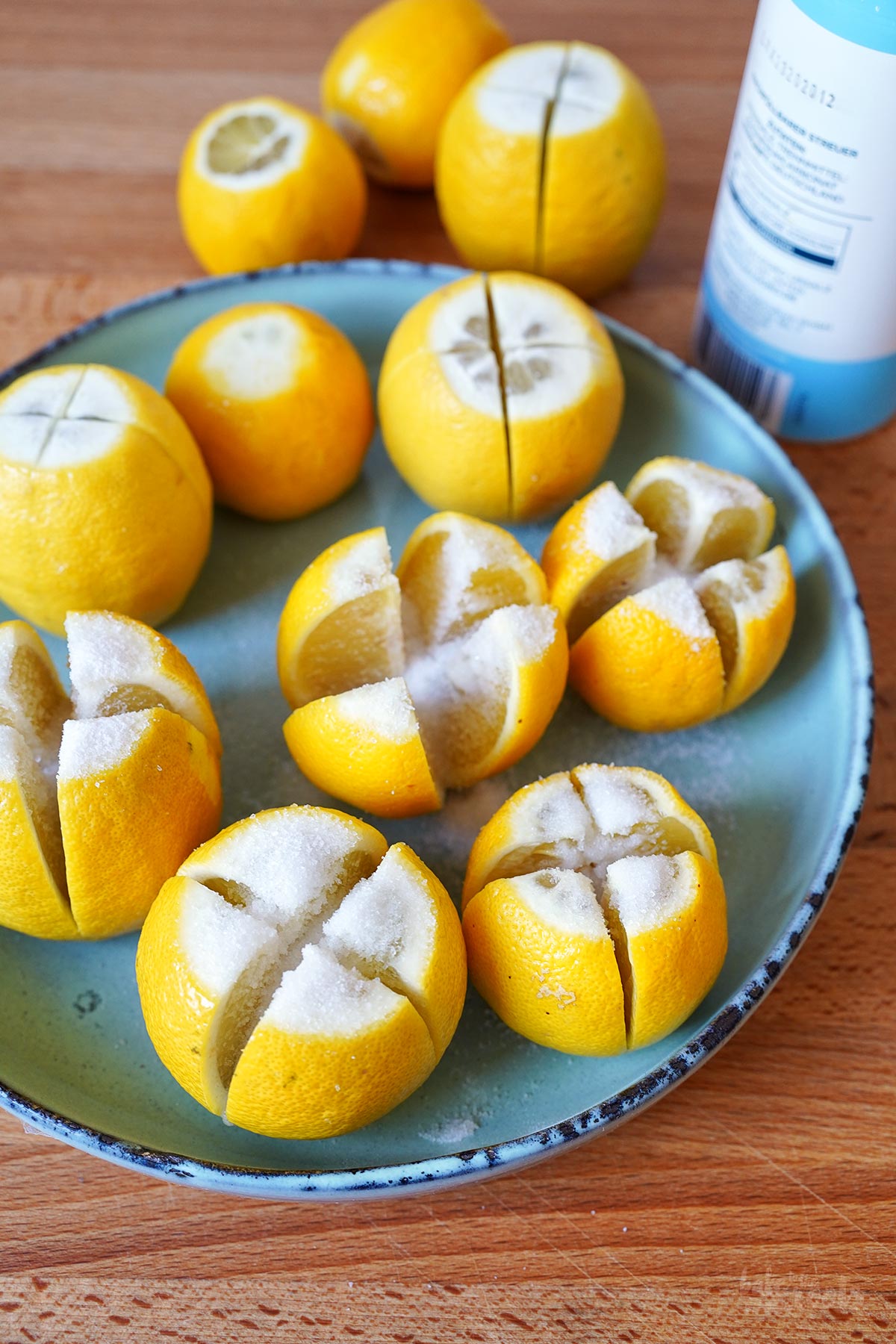
In Moroccan cuisine, preserved lemons are used quite often in various dishes. They can be used in many different ways. They play an important role in many Tajine dishes (e.g., Chicken Tajine), but can also be used in sauces, dressings, and dips. The salty lemons also work really well in soups, stews and braised dishes.
Since preserved lemons are not very common here in Germany, they are also a little harder to find in supermarkets. You have a better chance of finding them in stores with gourmet departments or where they sell delicatessen products. Here in Berlin, we would probably try our luck at KaDeWe – but since we now know how to make preserved lemons ourselves, the little trip to the west of the city is no longer necessary… :P
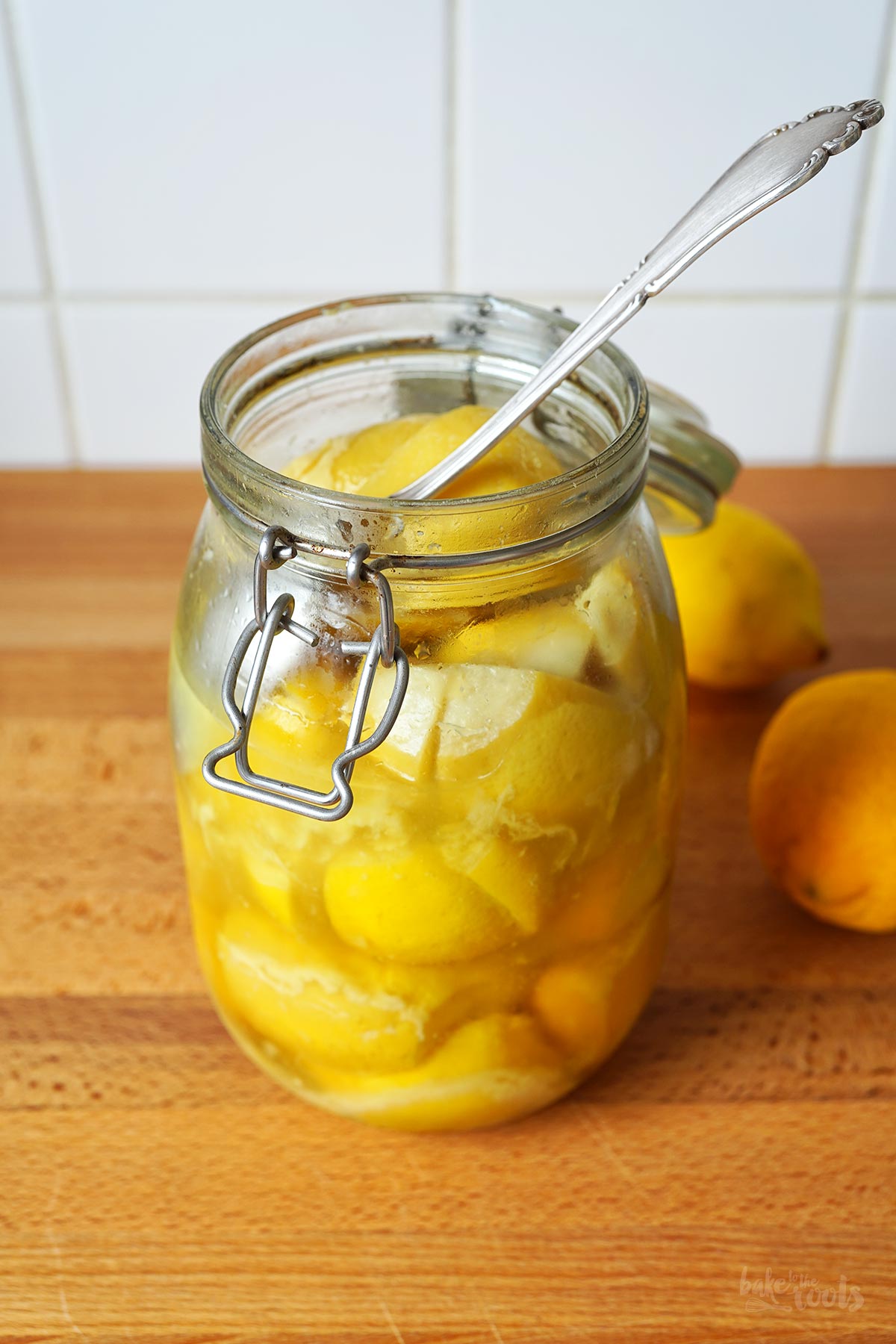
Preserving lemons is very easy. You don’t have to be a master in pickling stuff. A few clean organic lemons, a sterile glass container, a good amount of salt, and some additional lemon juice are all you need.
Whenever you are preserving/pickling fruit or veggies, it’s important to work very cleanly. It would be a real shame if all the work (and the products you use, of course) is wasted in the end because mold has formed in your glass jar, for example. Fortunately, it’s quite easy to sterilize preserving jars. You can use boiling water or (depending on the glass jar) also your oven. If the glass jars have been heated long enough, neither bacteria nor mold will have a chance to survive. ;)
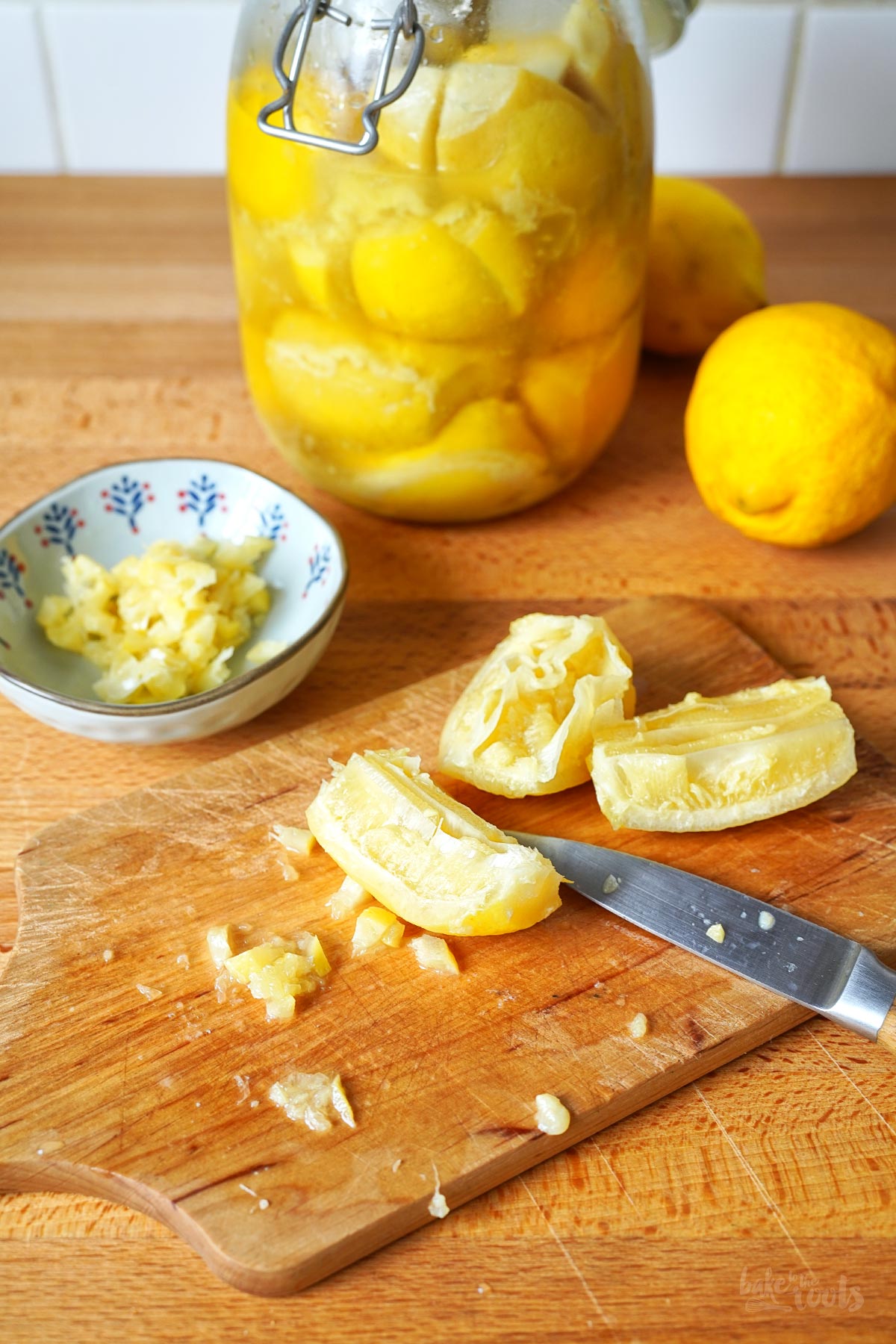
This recipe here is for a fairly large jar of preserved lemons, but you can make a smaller batch, of course. If you preserve lemons for the first time, you might want to make a smaller batch. Luckily, that’s no problem here – just use less lemons and a smaller glass jar…
As for the lemons – you should definitely use organic lemons and clean them thoroughly before throwing them into the glass jar. Regular lemons from the supermarket have various chemicals on their peel to prevent them from spoiling. You don’t want any of that in your preserving jar later on. All kinds of lemons are suitable to turn them into preserved lemons, but ideally they are a bit smaller and have less mesocarp between the flesh and the peel… Mesocarp is the slightly spongy white layer that tastes a little bitter. ;P
We work with food all the time here, so it’s only logical we also try recipes to preserve some of it for longer. We don’t have a large garden where it makes sense to pickle everything, but even with fruit and veggies from the farmer’s market, you can do a lot. When bell peppers are on sale, for example, you can use them to make delicious Homemade Pickled Grilled Bell Peppers. They are perfect as a side for a BBQ or simply for some sandwiches…
If you are into pickled gherkins, you should definitely try our Homemade Pickled Gherkins. The ones from the supermarket are often a bit mushy or too salty or too sour – if you pickle them at home, you have complete control over texture and flavors! Prepare them just the way you like them best!
INGREDIENTS / ZUTATEN
(1 large glass jar with lid)
7-10 organic lemons
2.5-3.5 oz. (70-100g) salt
1-1 1/2 cups (250-400ml) lemon juice
(1 großes Einmachglas)
7-10 Bio-Zitronen
70-100g Salz
250-400ml Zitronensaft
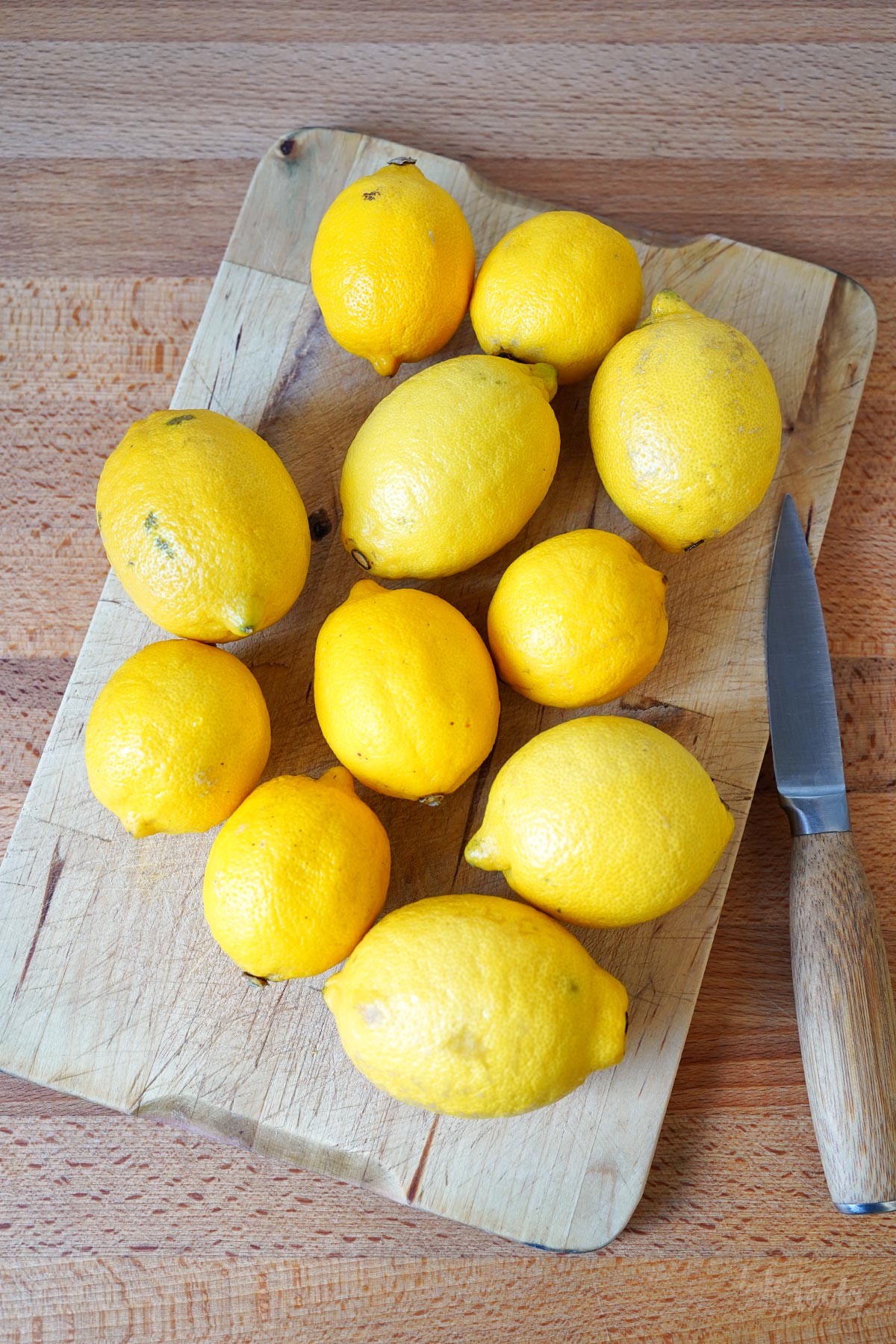



DIRECTIONS / ZUBEREITUNG
1. Sterilize a large preserving glass. Fill it with boiling water and let it stand for a few minutes, then pour the water out and let dry without wiping – this should do the trick. Make sure your glass jar fits in the fridge beforehand! ;)
2. Wash the organic lemons in hot water and dry them. Cut off the ends (just a bit) and then cut them into quarters lengthways. Make sure you don’t cut the lemons all the way through. The lemon wedges should remain together at one end. Carefully open the lemons a bit and sprinkle each one with 1-2 teaspoons of salt, then press them together again.
3. When all lemons are well salted, place them in the glass jar one after the other. Press the lemons together when placing them in the jar – you want them tightly packed. If the lemons break apart a little, don’t worry. Once all the lemons are in the jar, top up with lemon juice until all the lemons are covered with juice. Sprinkle some more salt on top and close the jar. Leave the jar at room temperature for 2-3 days, then place it in the fridge for 3-4 weeks. After this time, the lemons should have infused long enough for you to use them. Before using the lemons, rinse them with water to get rid of the salt and remove any seeds.
Tips:
+ To ensure that the lemons are completely covered with juice, I usually place the glass lid of a small preserving jar on top of the lemons. When closing the preserving jar, this glass lid presses the lemons down and ensures that the lemons are constantly submerged.
+ If you have worked clean (sterile) and stored the jar in the fridge, the preserved lemons should good to use for about 6 months (or even longer).
1. Ein großes Einmachglas sterilisieren – einmal mit kochendem Wasser befüllen und einige Minuten stehen lassen, dann ausschütten und ohne Auswischen trocknen lassen, sollte hier ausreichen. Man sollte vorab sicherstellen, dass das Glas in den Kühlschrank passt ;)
2. Bio-Zitronen heiß abwaschen und trocknen. Die Enden abschneiden und dann der Länge nach vierteln – hier sollte man darauf achten, dass man die Zitronen nicht ganz durchschneidet. Die Zitronenspalten sollten an einem Ende zusammenbleiben. Die Zitronenspalten vorsichtig auseinander drücken, jeweils mit 1-2 TL Salz bestreuen und dann wieder zusammendrücken.
3. Wenn alle Zitronen gut gesalzen sind, nacheinander ins Einmachglas legen. Die Zitronen beim Hineinlegen ins Glas zusammenpressen, damit möglichst keine Hohlräume entstehen. Sollten die Zitronen dabei etwas aufbrechen, ist das kein Problem. Wenn alle Zitronen im Glas sind, mit Zitronensaft auffüllen, bis alle Zitronen mit Saft bedeckt sind. Noch etwas Salz auf die Zitronen streuend und das Glas dann schließen. Das Glas für 2-3 Tage bei Zimmertemperatur stehen lassen, dann für 3-4 Wochen in den Kühlschrank stellen – nach dieser Zeit sollten die Zitronen lange genug gezogen haben, dass man sie verwenden kann. Die Zitronen vor der Verwendung kurz mit Wasser abspülen, um das Salz zu entfernen und ggf. Kerne herauspicken.
Tipps:
+ Damit die Zitronen komplett mit Saft bedeckt sind, platziere ich meist noch den Glasdeckel eines kleinen Einmachglases auf den Zitronen. Beim Schließen des Einmachglases drückt dieser Glasdeckel dann die Zitronen nach unten und stellt sicher, dass die Zitronen nicht herausschauen.
+ Wenn man sauber (steril) gearbeitet hat und das Glas im Kühlschrank lagert, dann sollten die eingelegten Zitronen etwa 6 Monate (oder länger) durchhalten.

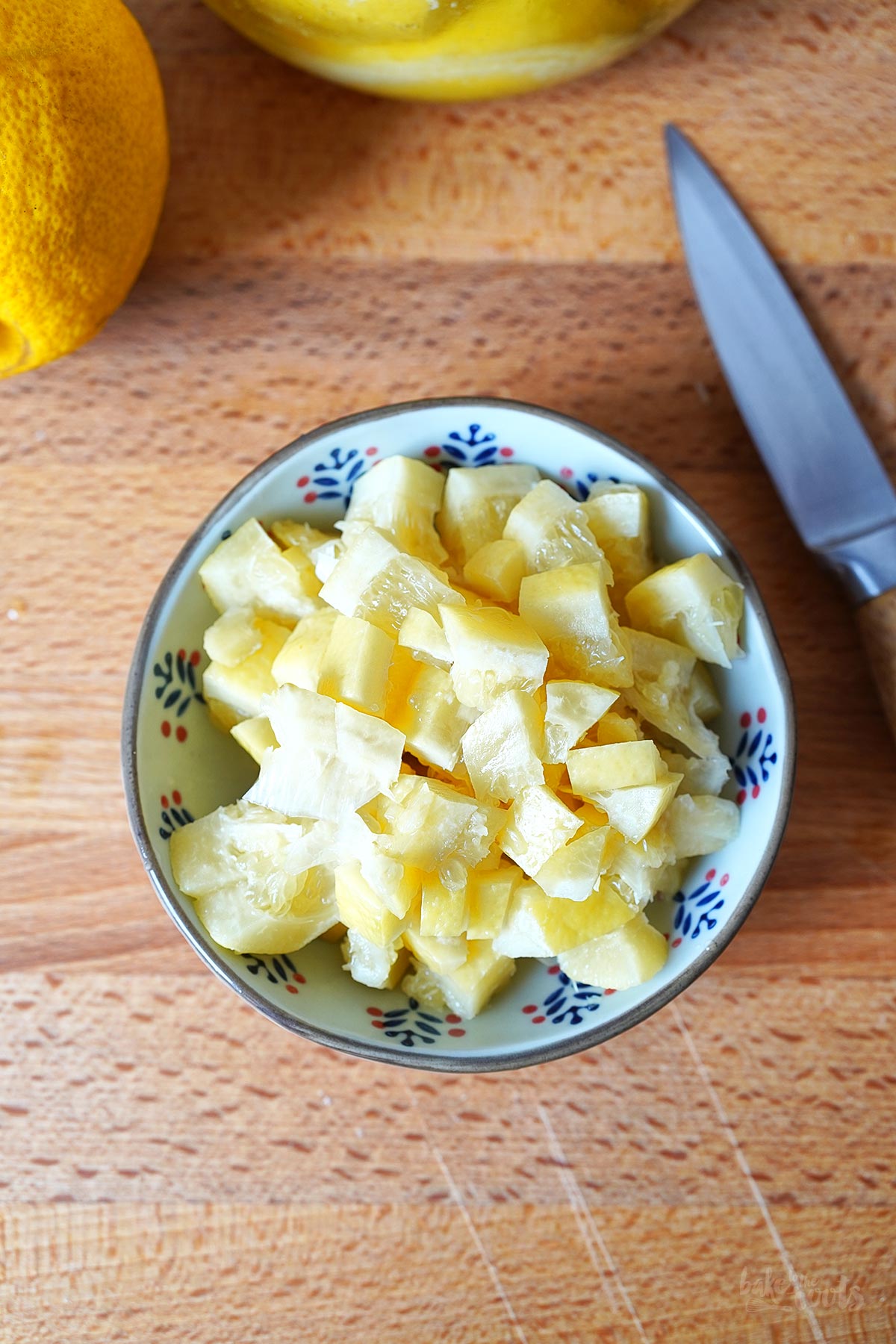
Craving more? Keep in touch on Facebook, Instagram and Pinterest for new post updates and more. You can also contact me with any questions or inquiries!
Here is a version of the recipe you can print easily.
Print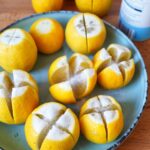
Preserved Lemons aka. Salt Lemons
- Prep Time: 00:15
- Cook Time: 00:00
- Total Time: 4 Weeks
- Yield: 1 1x
- Category: Homemade Stuff
- Cuisine: Morocco
- Diet: Vegan
Description
Preserved lemons are great to use in many different dishes and even bakes – if you like lemons, you should always have a glass of those in the fridge!
Ingredients
7-10 organic lemons
2.5-3.5 oz. (70-100g) salt
1-1 1/2 cups (250-400ml) lemon juice
Instructions
1. Sterilize a large preserving glass. Fill it with boiling water and let it stand for a few minutes, then pour the water out and let dry without wiping – this should do the trick. Make sure your glass jar fits in the fridge beforehand! ;)
2. Wash the organic lemons in hot water and dry them. Cut off the ends (just a bit) and then cut them into quarters lengthways. Make sure you don’t cut the lemons all the way through. The lemon wedges should remain together at one end. Carefully open the lemons a bit and sprinkle each one with 1-2 teaspoons of salt, then press them together again.
3. When all lemons are well salted, place them in the glass jar one after the other. Press the lemons together when placing them in the jar – you want them tightly packed. If the lemons break apart a little, don’t worry. Once all the lemons are in the jar, top up with lemon juice until all the lemons are covered with juice. Sprinkle some more salt on top and close the jar. Leave the jar at room temperature for 2-3 days, then place it in the fridge for 3-4 weeks. After this time, the lemons should have infused long enough for you to use them. Before using the lemons, rinse them with water to get rid of the salt and remove any seeds.
Notes
+ To ensure that the lemons are completely covered with juice, I usually place the glass lid of a small preserving jar on top of the lemons. When closing the preserving jar, this glass lid presses the lemons down and ensures that the lemons are constantly submerged.
+ If you have worked clean (sterile) and stored the jar in the fridge, the preserved lemons should good to use for about 6 months (or even longer).
Links marked with an asterisk (*) are affiliate links (advertising/Werbung) to Amazon Germany. If you click on one of those links and buy something via this link, I will get a commission for that sale. The price of whatever you buy is not affected in any way by this.


